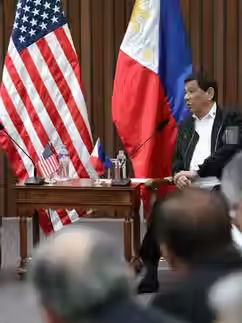The South China Sea: Warring Claims and Warring Words
Tahlia Beckitt

It seems like not a day goes by without new headlines of a clash between claimants in the South China Sea (Sea). Today, the Sea characterises much of the geopolitical discourse towards and within Southeast Asia. A critical maritime region, it has long been a source of contention between China and Southeast Asian nations. With overlapping claims left, right, and centre, and increasingly frequent clashes between fishing expeditions and naval commands, the waters of the highly disputed territory are far from calm.
Although ASEAN members and China have agreed to creating a Code of Conduct to regulate interactions within the Sea, negotiations have historically stalled and expectations for completion remain low. While the previously sidelined negotiations were reinvigorated last year after Indonesia announced it would champion the cause, and new guidelines for negotiation were signed in July, hopes for a binding Code of Conduct remain uncertain.
The History of the South China Sea Dispute
The South China Sea has a long history. The modern dispute emerged post-World War II following the evolution of Chinese international engagement and changing balances of power in East Asia. Here, the new Communist regime under Mao Zedong claimed successor status to the Republic of China, therefore allowing them to claim the territory held by the previous Nationalist regime. Today, China asserts that the area within the Nine Dash Line (roughly 90% of the Sea) forms part of its rightful territory. Naturally, given Chinese-Taiwanese history, Taiwan claims the same territory, dating it to the Eleven Dash Line asserted by Chiang Kai-Shek of the Nationalist Party and later Taiwanese government.
However, tensions exacerbated in the 1970s, when the Chinese military violently seized territory from Vietnam, who also acts as a fellow claimant of the Sea. The Philippines, Malaysia and Brunei also claim much of this territory as their own (see Figure 1), while Indonesia holds a smaller claim to territory through its own Exclusive Economic Zone. Since this time, the Philippines has been continually embroiled in clashes with China over territory in the region, with countless interactions between Filipino fishing expeditions and Chinese military vessels.
In light of these continued conflicts, the Philippines appealed to the United Nations Convention on the Law of the Sea (UNCLOS) court to challenge the legal basis of the Nine Dash Line claim. Successful in its endeavour, the decision bolstered the Philippines’ claim, however it has had little real effect as China refuses to recognise the ruling.
Indeed, the Sea has continued to act as a hotspot within Asian relations, with countries, like the US, lending diplomatic support to the Philippines in the face of perceived ‘Chinese Aggression.’
Geopolitical and Strategic Significance of the Sea
These clashes and continued instances of violence are not just about territory. A strategic location, the Sea connects Asia with international markets across the world, meaning that whoever controls the Sea occupies a leveraged position in international trade and commerce. In light of this, the Sea acts as a conduit for more than 30% of global maritime traffic each year and contains previously untapped oil and natural gas reserves. As such, the Sea presents innumerable opportunities for nations to greatly enhance their wealth and influence on the international stage, should they succeed in establishing a secure hold of the region.
In line with the benefits presented by the Sea, China has spent the last decade constructing artificial islands to cement its claim through international law, while also allowing it to have a continued military presence throughout the region. Satellite photographs taken in 2022 suggest that many of these new islands have been militarised and act as military bases.
In the News...Again
Whether it be the Philippines accusing China of attacking supply shipments to its island communities, concerns about the safety of international trade amid ongoing disputes following a collision between Filipino and Chinese Coastguard vessels, the Sea continues to feature prominently within news cycles.
The continued clashes undermine hopes for a binding code, while also preventing any construction of trust within the region. Likewise, while an undisclosed deal between China and the Philippines to end violence in the Sea was announced in July this year, both countries immediately released polarised and contradictory statements about its contents.
Although the Sea is not expected to devolve into a full regional conflict, the continuing tensions are far from helpful when it comes to promoting and maintaining global stability. However, given the continuing militarisation of the region, this possibility cannot be ruled out. Additionally, the involvement of the US in supporting the Philippines amid wider tensions with China, could potentially allow the disputes to act as a semi-proxy war between the two great powers in the future. Indeed, ASEAN and China’s value of non-interference works against the North American power, with its diplomatic intervention easily dismissed and criticised in foreign interference.
Where to From Here?
Given that 2024 and 2025 will see vital elections take place around the world and in the region, the disputes and the Sea have become increasingly politicised. The Philippines’ election in 2022 saw the dispute act as a significant point of contention and comparison between candidates. Likewise, the upcoming US election could have ramifications for US involvement in the region over the next half-decade.
Without a binding code or internationally accepted claims of the Sea’s territory, the conflict seems unlikely to dissipate. The path to a lasting solution remains fraught with challenges, likely requiring significant diplomatic cooperation between the conflicting nations, or alternatively extensive military presence and violence. As the rest of the world remains mostly preoccupied with overseas conflicts, disputes in the South China Sea continue to erupt at a consistent pace, preventing meaningful pursuits of peace.
Tahlia Beckett is currently studying International Relations at Curtin University and was the Future of Work delegate at the 2023 G20 Youth Summit in India. A former intern at Castle Asia in Jakarta, Tahlia is highly interested in Australia’s relations with Southeast Asia and the potential for effective and respectful diplomacy and cooperation between Australia and the broader Indo-Pacific. Tahlia has also engaged as a speaker at the 2023 World Food Forum Flagship Event and volunteers for the ASEAN-Australia Strategic Youth Partnership.

















Comments